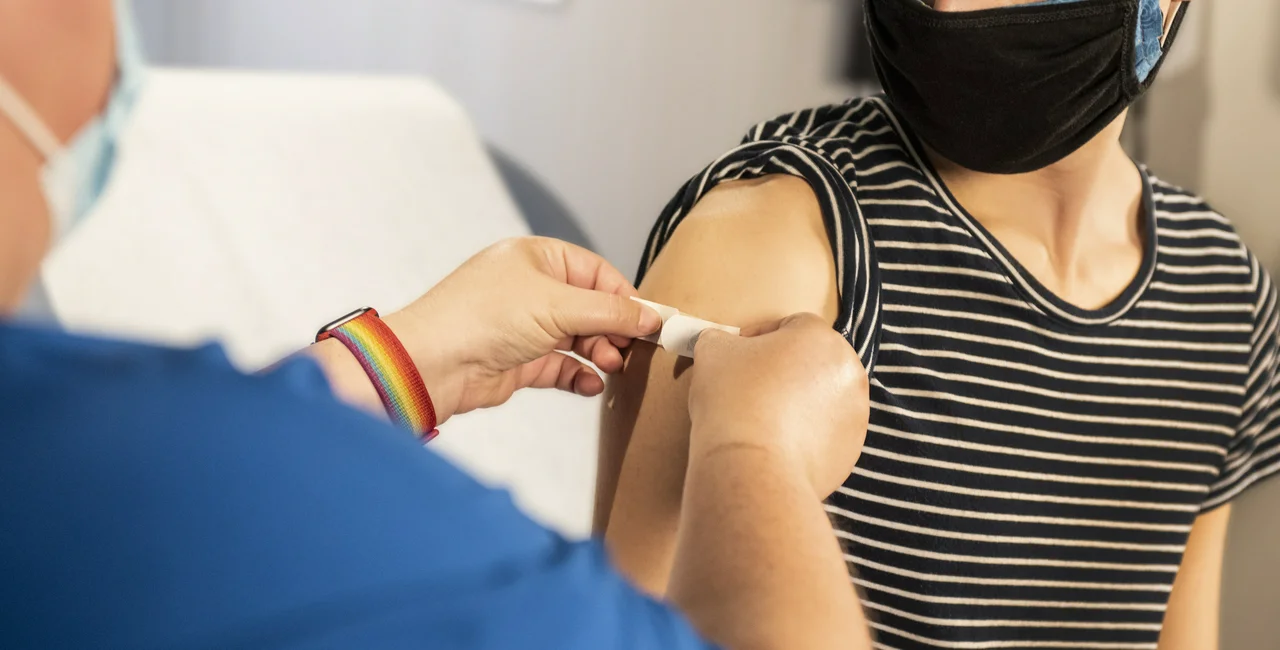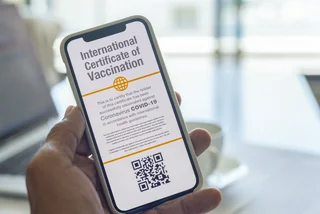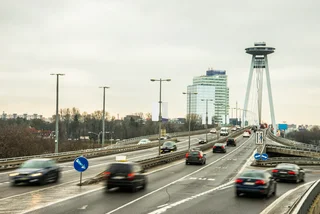Two weeks after final dose needed to be considered vaccinated
As of today, people will need to prove that they are two weeks after the second dose of vaccine (or one dose of the Janssen vaccine) to be considered vaccinated. It is no longer sufficient to show 22 days from the first dose of vaccination to prove that you are not capable of transmitting Covid-19, which is needed to visit some services or mass events. In such a case, it will be necessary to submit a negative test. Insurance covers four antigen tests a month, which proves non-infectiveness for three days, and two PCR tests a month, which are valid for seven days. The government has tightened conditions due to the risk of spreading the Delta variant, against which a single dose of vaccine is less effective. People should show proof when entering mass events in culture or sports, when visiting a theater, or when using certain services such as accommodation, swimming pools, hairdressing, or wellness. People should also prove themselves at the inspection when visiting a restaurant, but the operators do not have to check the certificates. According to Health Minister Adam Vojtěch, however, a change is being considered.
New rules take effect for returning employees
People who have not had Covid-19 in the last six months or have not completed their vaccinations must submit a negative test when returning from work abroad from today. According to the current emergency measure, without it, the employer may not let them into the workplace if they come from countries with a high level of risk according to the traveler's map published by the Ministry of Foreign Affairs. From countries with moderate or medium risk, they can work with a respirator, which they must wear until the test result.
Fully inoculated Czechs exempt from Covid tests when returning from abroad
As of July 9, fully inoculated Czechs and long-term residents will not have to undergo the coronavirus tests or quarantine when returning from abroad irrespective of the country from which they will come, Foreign Minister Jakub Kulhánek tweeted. They will only have to fill in the arrival form. This will also include countries listed as extremely risky. See our full story here.
Tečka app was modified to cover Janssen vaccine
The mobile application Tečka, which carries confirmation of vaccination or covid tests, has been updated, the National Agency for Information and Communication Technologies (NAKIT) announced on Twitter. It worked poorly for Johnson & Johnson's Janssen single-dose vaccine. Users pointed out that with the single-dose vaccine, the application confirmed the full vaccination after 21 days instead of the correct 14 days as with the other completed vaccinations. "This morning, a correction of the parameter settings in the Tečka application for Janssen vaccination was deployed. There is no need to update the application," the authors said.
Dnes ráno byla nasazena oprava nastavenà parametru v aplikaci TeÄka - oÄkovánà vakcÃnou Janssen (14 dnÃ). Aktualizace aplikace nenà potÅ™eba.
— NAKIT (@NAKIT_sp) July 8, 2021
Czech Republic to get less Covid vaccine in July than in June
In July, the Czech Republic will get almost 1 million fewer doses of Covid vaccines than in June. Mainly the supply of the most frequently used Pfizer/BioNTech vaccine will decrease, according to the data on vaccine supplies released by the Central Bohemia Region. Prime Minister Andrej Babiš told the daily Mladá fronta Dnes today that the lowered supplies should suffice to cover the needs of the Czech Republic. In June, the Czech Republic received some 3.5 million doses of vaccine, with roughly 2.3 million from Pfizer/BioNTech. The supplies also included about 650,000 doses of the single-dose vaccine from Johnson & Johnson, 307,000 doses of the vaccine from Moderna and some 255,000 doses from AstraZeneca. In July, the Czech Republic is to get about 160,000 doses of the Moderna vaccine and 370,000 from Johnson & Johnson. The country also expects a supply of about 400,000 doses from AstraZeneca. However, the Czech Radio has reported that the Czech state would like to donate them to some non-European country.
Slovakia toughening entry conditions for arrivals
Slovakia today introduced stricter conditions for arrivals to the country due to the spread of the more infectious coronavirus mutation, but the travelers with complete Covid vaccination will not have to be quarantined. The exceptions from the quarantine will relate to selected professions, the transit across the country and temporarily also to commuters as well as those who have received the first dose of the Covid vaccine. Newly, the country of arrival will not no longer matter. It will be decisive whether the person was Covid vaccinated or fulfills any of the exceptions from the quarantine. Slovakia will demand a two-week quarantine for all who were not Covid vaccinated. The isolation may be prematurely ended after presenting a negative PCR coronavirus test, which may be made on the fifth day of the quarantine at the earliest. The persons over 12 must be registered online when entering Slovakia at the latest. Until August 9, an exception will cover Czechs who have at least one dose of Covid as well as teenagers between 12 and 18.
Slovakia reopens small border crossings
The police announced that small border crossings with neighboring countries would reopen on Friday. On the border with the Czech Republic, Bratislava closed 14 out of the total 32 border crossings on Monday, which complicated traffic between the two countries and provoked protests on the borders. The traffic at the selected border crossings will resume after the Slovak government earmarked the staff of the financial control and prison service to help the police. The police said at all big road border crossings, there would be permanent checks of the observance of quarantine duties and on small border crossings, there would be regular monitoring. The police conduct checks of EU Covid certificates also by means of mobile readers.
One-fifth of Covid hospitalized needed intensive care
One-fifth of the more than 78,000 patients hospitalized with Covid-19 in the Czech Republic this year needed intensive care, while 16,600 of them ended up in intensive care units, former deputy health minister Vladimír Černý said at an expert conference. He was in charge of the intensive care management at the Health Ministry.
"It is fully apparent that the load of the intensive care system was absolutely unprecedented and that such a situation never before occurred in the history of the Czech Republic," Černý said.
Since the Covid-19 epidemic outbreak in March, 2020, almost 1.7 million people have been provably infected with the novel coronavirus in the 10.7-million Czech Republic, while more than 30,300 of them have died. Currently, the hospitalization of Covid patients does not affect the provision of other health care with some exceptions, Černý said. A possible spread of the more infectious Delta mutation does not pose a risk either so far, he added. "The number of patients at the intensive care units is not rising, though the number of new [Covid-19] cases is on the rise," he said.
Health Ministry: Presence of antibodies not sufficient proof
The Czech Ministry of Health is not currently planning to recognize antibodies after Covid-19 as another prerequisite for proving non-infectivity, Health Minister Adam Vojtěch said. According to him, the finding of antibodies only means that the person has most likely suffered from Covid, but it is not possible to determine when and whether they are sufficiently protected.
Czech Republic rises to 17th place in EU for Covid
According to the number of coronavirus infections in the last 14 days, the worst situation in the European Union remains in Cyprus (493 cases per 100,000 population, 180 weeks ago). As in the previous week, Portugal is the second most affected country (241 cases per 100,000 inhabitants, 169 cases a week ago). Spain remains third (215 cases, 107 weeks ago). In the Czech Republic, which was the worst from the beginning of February to mid-March, the number of cases is growing slightly, with 18 cases in 17th place (a week ago it was in 20th place with 17 cases). This is according to data from the European Center for Disease Control and Prevention (ECDC).
Covid numbers rise significantly over last week
The Covid situation continues to worsen. The reproduction number R rose slightly to 1.22, meaning the extent of the pandemic is expanding. The number of new cases reported on Thursday was 254, down slightly from the previous day but up from last Thursday when there were 163 cases. There were 11 new cases per 100,000 people over seven days, up by one from the previous day. For Prague, the number of new cases per 100,000 people over seven days rose to 33, also up one from the previous day. There were 79 new Covid cases reported in Prague on Thursday, up from 67 in the previous week.
Latest Covid-19 data from the Czech Ministry of Health (July 9, 2021)
- New cases 254
- Deaths 30,311
- Currently hospitalized 34
- PCR tests performed 8,260,298
- Antigen tests performed 22,324,001
- Total vaccinations 8,796,093
- Daily increase in vaccinations 90,960
- People who have completed vaccination 3,708,711
- New cases per 100,000 in seven days 11
- PES index 44
- R number 1.22












 Reading time: 6 minutes
Reading time: 6 minutes 































